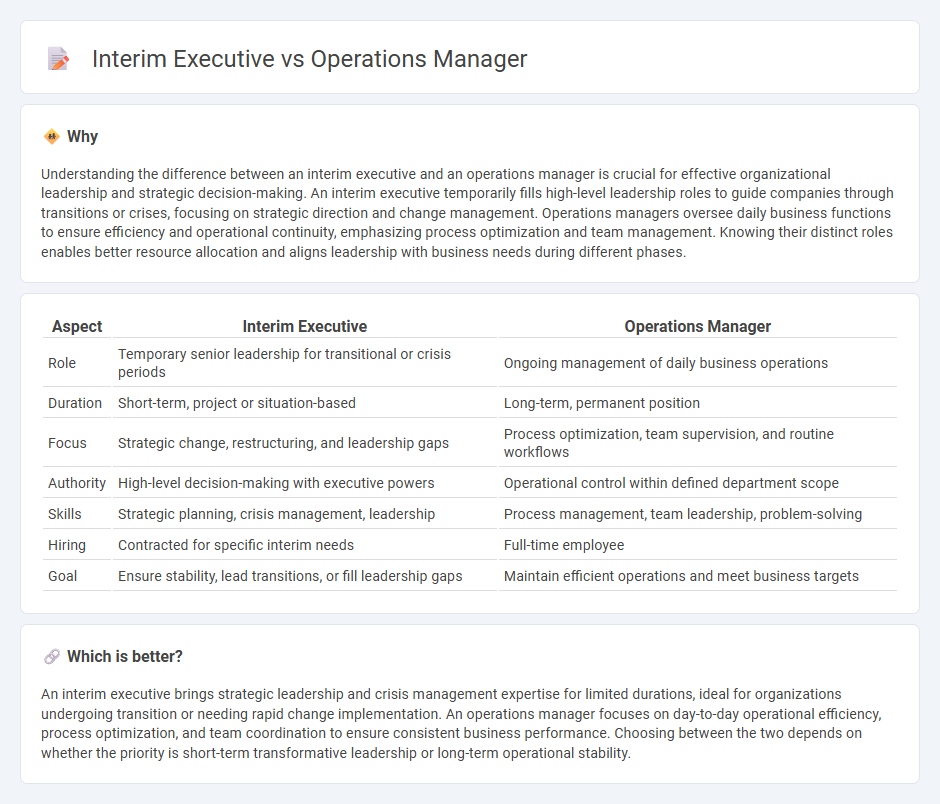
An interim executive provides temporary, high-level leadership to guide organizations through transitions or crises, focusing on strategic decision-making and long-term planning. In contrast, an operations manager handles the day-to-day administration and oversight of business processes to ensure efficiency and productivity. Discover more about their distinct roles and how they impact organizational success.
Why it is important
Understanding the difference between an interim executive and an operations manager is crucial for effective organizational leadership and strategic decision-making. An interim executive temporarily fills high-level leadership roles to guide companies through transitions or crises, focusing on strategic direction and change management. Operations managers oversee daily business functions to ensure efficiency and operational continuity, emphasizing process optimization and team management. Knowing their distinct roles enables better resource allocation and aligns leadership with business needs during different phases.
Comparison Table
| Aspect | Interim Executive | Operations Manager |
|---|---|---|
| Role | Temporary senior leadership for transitional or crisis periods | Ongoing management of daily business operations |
| Duration | Short-term, project or situation-based | Long-term, permanent position |
| Focus | Strategic change, restructuring, and leadership gaps | Process optimization, team supervision, and routine workflows |
| Authority | High-level decision-making with executive powers | Operational control within defined department scope |
| Skills | Strategic planning, crisis management, leadership | Process management, team leadership, problem-solving |
| Hiring | Contracted for specific interim needs | Full-time employee |
| Goal | Ensure stability, lead transitions, or fill leadership gaps | Maintain efficient operations and meet business targets |
Which is better?
An interim executive brings strategic leadership and crisis management expertise for limited durations, ideal for organizations undergoing transition or needing rapid change implementation. An operations manager focuses on day-to-day operational efficiency, process optimization, and team coordination to ensure consistent business performance. Choosing between the two depends on whether the priority is short-term transformative leadership or long-term operational stability.
Connection
Interim executives and operations managers are connected through their focus on driving organizational efficiency and performance during transition periods. Interim executives often step in to provide strategic leadership and continuity when permanent leaders are absent, while operations managers handle the day-to-day activities ensuring that business processes run smoothly. Both roles require a deep understanding of business operations to align short-term actions with long-term organizational goals effectively.
Key Terms
**Operations Manager:**
Operations Managers oversee daily business functions, optimize workflows, and ensure resource allocation aligns with company goals, driving efficiency and productivity. Typically permanent team members, they develop long-term strategies to improve operational performance and maintain organizational stability. Discover how an Operations Manager can transform your business operations efficiently.
Process Optimization
Operations managers specialize in enhancing efficiency by streamlining daily workflows and managing ongoing process improvements within an organization. Interim executives bring strategic expertise during transitional periods, focusing on high-impact process optimization projects that align with long-term business objectives. Discover how each role drives operational excellence to meet your company's unique needs.
Resource Allocation
Operations managers oversee daily resource allocation to optimize productivity and maintain operational efficiency across departments. Interim executives take a strategic approach in resource allocation during transitional periods, aligning resources with long-term organizational goals and driving change management. Explore the distinct roles and impacts of operations managers and interim executives in resource allocation for better business outcomes.
Source and External Links
What does an operations manager do? - CareerExplorer - This page details the responsibilities of an operations manager, including strategic planning, resource management, quality control, and team leadership.
How to Become an Operations Manager - This guide explores the role of an operations manager, emphasizing both hard and soft skills required for success in the position.
Operations Manager jobs in Philadelphia, PA - Indeed - Lists available operations manager jobs in Philadelphia, highlighting roles in logistics and transportation companies.
 dowidth.com
dowidth.com